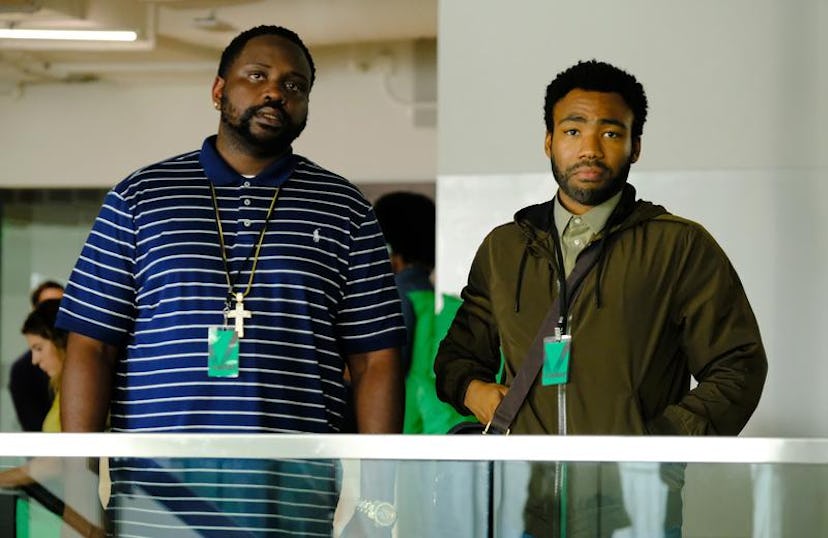Important Questions We Have About Atlanta Robbin’ Season Episode 2

Atlanta’s refusal to explain its in-jokes and references, and the pace at which these allusions are made, is part of what makes watching the show a rich and textured experience—and kind of befuddling. If you blink for a second, Atlanta will leave you behind, and whether you catch its references or not Donald Glover still shirks most requests to explain his surrealist TV series. So we’re here to ask the important questions, and maybe find some answers.
In “Sportin’ Waves,” the second episode of Atlanta: Robbin’ Season, things begin with another drug deal gone wrong—this time involving Alfred, when he is robbed at gunpoint by a friend-slash-dealer who thinks that Al’s music career as Paper Boi has made him rich, leaving him to find a new supplier. Everyone wants a piece of Paper Boi—the first supplier he visits with Darius slyly takes pics of them smoking and posts them to Instagram; the second gives Alfred’s number to his “gangsta” girlfriend, a Paper Boi fan who also sings twee acoustic covers of rap songs on YouTube. Meanwhile, Alfred is not making as much money as he should be off his eponymous hit single, “Paper Boi,” so he is also now doing promotional voiceovers for a music streaming service à la Spotify, at the risk of selling out. “You’re gonna be happy that you did this,” Earn tells Alfred as they stand in the office laden with free snacks and ridiculous rappers performing amongst cubicle employees and lending their vocals to chocolate milk commercials—something Alfred has repeatedly made clear he will never do, unless the price is really right. “I’ll say that when I get that check,” Alfred reminds Earn. Scam or be scammed seems to be the lesson of the week; whether that’s scamming yourself by selling out, or running a scam on someone else.
But during Paper Boi’s never-ending tango with fame, a new character introduced in the season premiere is the one to watch in this episode. Tracy—Alfred and Darius’s new, goofy roommate played by Khris Davis—proudly emerges from the background with his durag snugly fastened to his head. He has a hapless swagger that reads as harmless, but you can tell he really believes that he is an authority on the subjects of hair care and self image. With the introduction of Tracy, some questions may emerge for the viewer:
Why is Tracy trying to get waves on his head?
“First, you gotta brush it,” Tracy tells Earn, Darius, and Alfred, after they clown him for insisting that the curls he’s attempting to lay down under his durag will result in smooth waves in his hair. “And then, you just let ’em bake!”
Tracy is sure that his fresh waves will convince white employers to hire him for a marketing job, which may feel all too familiar for black viewers who have had the experience of changing their appearance in order seem suitable for a job. The tragedy of Tracy is that up until the final scene, he is all laughs. He’s not Alfred, he doesn’t mind the idea of “selling out.” Hegoes into the interview so full of hope—the closeup shot of the back of his head reveals that he really did bake his waves to perfection—you believe that just maybe there is a chance he might get the job, but the interviewer immediately shuts him down. It’s an example of what Atlanta does best—in just a few frames, a clear point is driven home.
How exact does Tracy’s gift card scam work?
The self-proclaimed “prince of tides” (tides, because of the waves) convinces Earn to give him his money so that he can scam some stores into giving him free stuff by making purchases with gift cards. For this particular scam, Tracy encourages Earn to hand over his thousands of dollars of cash (earned from assisting Darius with trading in a sword for a massive dog in season one’s delightfully absurd episode, “The Streisand Effect”) so that he can double it on some fraudulent gift cards.
It has actually been reported that gift card hackers can easily run rampant without ever being caught, and given the meaning behind the title of this iteration of the show (Robbin’ Season), it makes perfect sense to include that tidbit in this episode. Earn emerges from the mall with an armful of stuff he bought with the fraudulent gift cards (after narrowly escaping mall security, as he learns via text from Tracy).
Do some shopping malls really have a “no chase” policy?
When Tracy brings Earn to the mall, he walks into a shoe store and asks for his advice. He calls Earn the “preppy” type—he did go to Princeton, so sure—and uses him as a culture translator. After making one cunning Bojack Horseman reference, Tracy steals some shoes from the store for his upcoming job interview. He remains completely nonplussed, and calmly walks out of the store with the loafers in hand. He tells Earn that the mall has a “no chase policy.”
This is apparently a real practice for some stores in shopping malls. If an employee chases a shoplifter and breaks their ankle in the process, the store would likely have to cover that employee’s medical bills, so some retailers have a “no chase” policy to protect their employees.
Scam or be scammed, right?
Related: Atlanta‘s “Florida Man,” Explained: The Story Behind the Mysterious Meme in the Season 2 Premiere